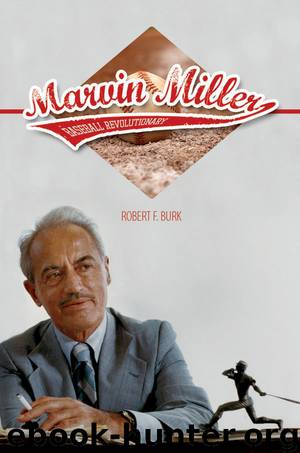Marvin Miller, Baseball Revolutionary (Sport and Society) by Robert F Burk

Author:Robert F Burk [Burk, Robert F]
Language: eng
Format: epub
Publisher: University of Illinois Press
Published: 2015-01-30T07:00:00+00:00
Twelve
Emancipation
Despite the impressive gains recorded by Marvin Miller’s MLBPA, in 1975 baseball remained the only major professional sport in America that lacked a version of free agency for its performers. To be sure, in such cases as the NFL—where the “Rozelle rule” authorized the league’s commissioner to determine compensation in the form of a player of “equal status” from the team signing a free agent—the right existed more in theory than fact. Every spring training since 1967, Miller had reiterated to his membership that according to his reading of the Uniform Player’s Contract, paragraph 10(a), a club could only renew an unsigned performer’s services “for a period of one year on the same terms” save a unilateral pay cut of 20 percent. Under the 1973 Basic Agreement, the union could not seek either direct modification or elimination of the reserve language via negotiation until the pact expired at the end of 1975. But nothing prevented the union from testing management’s interpretation of the 10(a) language through grievance arbitration, so long as the litigating player remained unsigned through the end of his option year. Given the bonanza Catfish Hunter had just reaped as a result of his free agency from a successful grievance, it finally seemed likely that a new season would produce a direct reserve clause test.1
It was therefore no surprise that the 1975 season unfolded as prelude to a reserve-clause showdown. For Miller the year started in typical fashion, with him defending individual members from press attacks and arbitrary club discipline. In St. Petersburg, despite the fact local authorities had dropped the charges, an indecent-exposure accusation against Mets outfielder Cleon Jones led his organization to fine him $2,000 and pressure him into a humiliating public confession. Miller scathingly condemned the degrading spectacle. By August, the executive director was once more in his annual scrap with the Sporting News’ Johnson Spink, this time over the editor’s attacks on the salary-arbitration system. Defending the idea that a player could unilaterally demand a hearing but an owner could not similarly scuttle one, Miller retorted to Spink, “If you are hung up on ‘one-way streets,’ where is your editorial urging that a player should have the right to renew his contract for one additional year by simply notifying a club that he is doing so?”2
Providing a backdrop to Miller’s renewed call to reform the reserve system was a strike that summer by the NFLPA, with the football union trumpeting the slogan, “Players demand freedom!” Miller observed the football players’ action from the sidelines with interest, but he considered NFLPA leader Ed Garvey at best an inept amateur. Three years earlier in response to a CBS reporter, the executive director had indirectly slammed the football union by insisting that in contrast to its counterpart the MLBPA was “not in the nature of a joke.” Given Miller’s leftist roots, he viewed Garvey’s postwar service as a CIA mole inside the pro-Communist World Federation of Trade Unionists as additional reason for contempt. He was hardly surprised,
Download
This site does not store any files on its server. We only index and link to content provided by other sites. Please contact the content providers to delete copyright contents if any and email us, we'll remove relevant links or contents immediately.
Blood and Oil by Bradley Hope(1565)
Wandering in Strange Lands by Morgan Jerkins(1426)
Ambition and Desire: The Dangerous Life of Josephine Bonaparte by Kate Williams(1394)
Daniel Holmes: A Memoir From Malta's Prison: From a cage, on a rock, in a puddle... by Daniel Holmes(1336)
Twelve Caesars by Mary Beard(1324)
It Was All a Lie by Stuart Stevens;(1300)
The First Conspiracy by Brad Meltzer & Josh Mensch(1173)
What Really Happened: The Death of Hitler by Robert J. Hutchinson(1167)
London in the Twentieth Century by Jerry White(1149)
The Japanese by Christopher Harding(1134)
Time of the Magicians by Wolfram Eilenberger(1131)
Twilight of the Gods by Ian W. Toll(1123)
A Woman by Sibilla Aleramo(1096)
Cleopatra by Alberto Angela(1094)
Lenin: A Biography by Robert Service(1080)
John (Penguin Monarchs) by Nicholas Vincent(1071)
The Devil You Know by Charles M. Blow(1028)
Reading for Life by Philip Davis(1027)
The Life of William Faulkner by Carl Rollyson(993)
